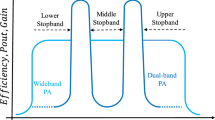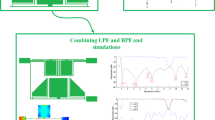Abstract
In this paper, a co-design of a dual-band low-noise amplifier (DB-LNA) with a dual-band band-pass filter (DB-BPF) for a radio navigation aid (RNA) application was proposed. The novel development was that the DB-LNA was directly integrated with the DB-BPF instead of connecting the output matching network (OMN) of the DB-LNA to the 50 Ω-port of the DB-BPF. Thus, this DB-BPF had a double function, serving as the DB-BPF and also as the OMN. This architecture was called the co-design structure. ZIN analysis was used to evaluate the co-design network structure. In general, the design procedure was divided into four sections, including (1) DB-BPF, (2) DB-LNA, (3) Cascade DB-LNA and DB-BPF, and (4) Co-design DB-LNA and DB-BPF. The co-design method was applied in an RNA implementation at dual-band frequencies of 113 MHz and 332 MHz. Validation of the proposed structure is confirmed for its accuracy by simulating the impedance characteristic ZIN, S parameter simulation, and measurement results. The key contributions of this paper were that: (1) The co-design structure could reduce the passive component by 31.5%, (2) the total size of the DB-LNA and DB-BPF using the co-design method was smaller than the cascaded method by 11.36%, (3) more light-weight in fabrication due to a smaller size, and (4) finally, the proposed LNA has a higher figure of merit than the other LNA.


























Similar content being viewed by others
References
Sim, C. Y. D., Shih, Y. K., & Chang, M. H. (2015). Compact slot antenna for wireless local area network 2.4/5.2/5.8 GHz applications. IET Microwaves, Antennas and Propagation, 9(6), 495–501. https://doi.org/10.1049/iet-map.2013.0688.
Yang, C. W., & Jung, C. W. (2010). Broad dual-band PIFA using self-complementary structure for DVB-H applications. Electronics Letters, 46(9), 606–608. https://doi.org/10.1049/el.2010.0512.
Sattar, S., Zainal, T. U. N., & Zulkifli, A. (2017). A 2. 4/5. 2-GHz concurrent dual-band CMOS low noise amplifier. IEEE Access, 5, 2148–21156. https://doi.org/10.1109/ACCESS.2017.2756985.
Firmansyah, T., et al. (2017). Dual-wideband band pass filter using folded cross-stub stepped impedance resonator. Microwave and Optical Technology Letters, 59(11), 2929–2934. https://doi.org/10.1002/mop.30848.
Qi, G., Mak, P. I., & Martins, R. P. (2017). A 0.038-mm2 SAW-less multiband transceiver using an N-Path SC gain loop. IEEE Journal of Solid-State Circuits, 52(8), 2055–2070. https://doi.org/10.1109/JSSC.2017.2697409.
Farazian, M., Asuri, B., & Larson, L. E. (2010). A dual-band CMOS CDMA transmitter without external SAW filtering. IEEE Transactions on Microwave Theory and Techniques, 58(5 PART 2), 1349–1358. https://doi.org/10.1109/tmtt.2010.2042851.
Maeda, T., et al. (2006). A low-power dual-band triple-mode WLAN CMOS transceiver. IEEE Journal of Solid-State Circuits, 41(11), 2481–2489. https://doi.org/10.1109/JSSC.2006.883323.
Chang, W. S., & Chang, C. Y. (2011). Analytical design of microstrip short-circuit terminated stepped-impedance resonator dual-band filters. IEEE Transactions on Microwave Theory and Techniques, 59(7), 1730–1739. https://doi.org/10.1109/TMTT.2011.2132140.
Le Dai, G., Guo, Y. X., & Xia, M. Y. (2010). Dual-band bandpass filter using parallel short-ended feed scheme. IEEE Microwave and Wireless Components Letters, 20(6), 325–327. https://doi.org/10.1109/LMWC.2010.2047517.
Tseng, C. H., & Shao, H. Y. (2010). A new dual-band microstrip bandpass filter using net-type resonators. IEEE Microwave and Wireless Components Letters, 20(4), 196–198. https://doi.org/10.1109/LMWC.2010.2042549.
Liu, H. W., et al. (2010). Compact dual-band bandpass filter using defected microstrip structure for GPS and WLAN applications. Electronics Letters, 46(21), 1444–1445. https://doi.org/10.1049/el.2010.2146.
Hung, C.-Y., Yang, R.-Y., & Lin, Y.-L. (2010). A simple method to design a compact and high performance dual-band bandpass filter for GSM and WLAN. Progress in Electromagnetics Research C, 13, 187–193.
Chen, X., Han, G., Ma, R., Gao, J., & Zhang, W. (2009). Design of balanced dual-band bandpass filter with self-feedback structure. ETRI Journal, 31(4), 475–477. https://doi.org/10.4218/etrij.09.0209.0062.
Weng, M. H., Wu, H. W., & Su, Y. K. (2007). Compact and low loss dual-band bandpass filter using pseudo-interdigital stepped impedance resonators for WLANs. IEEE Microwave and Wireless Components Letters, 17(3), 187–189. https://doi.org/10.1109/LMWC.2006.890463.
Mingqi, Z., Xiaohong, T., & Fei, X. (2008). Compact dual band bandpass filter using novel E-type resonators with controllable bandwidths. IEEE Microwave and Wireless Components Letters, 18(12), 779–781. https://doi.org/10.1109/LMWC.2008.2007696.
Wu, B., Liang, C. H., Li, Q., & Qin, P. Y. (2008). Novel dual-band filter incorporating defected SIR and microstrip SIR. IEEE Microwave and Wireless Components Letters, 18(6), 392–394. https://doi.org/10.1109/LMWC.2008.922614.
Lin, Y. C., Horng, T. S., & Huang, H. H. (2014). Synthesizing a multiband LTCC bandpass filter with specified transmission- and reflection-zero frequencies. IEEE Transactions on Microwave Theory and Techniques, 62(12), 3351–3361. https://doi.org/10.1109/TMTT.2014.2365454.
Qin, P., & Xue, Q. (2017). Compact wideband LNA with gain and input matching bandwidth extensions by transformer. IEEE Microwave and Wireless Components Letters, 27(7), 657–659. https://doi.org/10.1109/LMWC.2017.2711524.
Qin, P., & Xue, Q. (2017). Design of wideband LNA employing cascaded complimentary common gate and common source stages. IEEE Microwave and Wireless Components Letters, 27(6), 587–589. https://doi.org/10.1109/LMWC.2017.2701300.
Belmas, F., Hameau, F., & Fournier, J. (2012). A low power inductorless wideband LNA with Gm enhancement and noise cancellation. IEEE Microwave and Wireless Components Letters, 47(5), 1094–1103. https://doi.org/10.1109/JSSC.2012.2185533.
Singh, R., Slovin, G., Xu, M., Schlesinger, T. E., Bain, J. A., & Paramesh, J. (2017). A reconfigurable dual-frequency narrowband CMOS LNA using phase-change RF Switches. IEEE Transactions on Microwave Theory and Techniques, 65(11), 4689–4702. https://doi.org/10.1109/TMTT.2017.2742481.
Ulusoy, A. Ç., Kaynak, M., Purtova, T., Tillack, B., & Schumacher, H. (2012). 24 to 79 GHz frequency band reconfigurable LNA. Electronics Letters, 48(25), 1598–1600. https://doi.org/10.1049/el.2012.2830.
Wibisono, G., & Firmansyah, T. (2012). Concurrent multiband low noise amplifier with multisection impedance transformer. In Asia-Pacific Microwave Conference Proceedings, APMC, 2012, https://doi.org/10.1109/apmc.2012.6421776.
Wu, W. J., Liu, Q. F., Zhang, Q., & Deng, J. Y. (2013). Co-design of a compact dual-band filter-antenna for WLAN application. Progress in Electromagnetics Research, 40(May), 129–139. https://doi.org/10.2528/PIERL13030411.
Zhang, B., Zhang, W., Runbo, M., Zhang, X., & Mao, J. (2008). A co-design study of filters and oscillator for low phase noise and high harmonic rejection. ETRI Journal, 30(2), 344–346. https://doi.org/10.4218/etrij.08.0207.0292.
Oraizi, H., & Esfahlan, M. S. (2010). Optimum design of lumped filters incorporating impedance matching by the method of least squares. Progress in Electromagnetics Research, 100, 83–103. https://doi.org/10.2528/PIER09111611.
Ma, R., & Zhang, W. (2010). Co-design of dual-band low noise amplifier and band-pass filter. Asia-Pacific Symposium on Electromagnetic Compatibility, APEMC, 2010, 1378–1380. https://doi.org/10.1109/APEMC.2010.5475589.
Joshi, H., & Chappell, W. J. (2006). Dual-band lumped-element bandpass filter. IEEE Transactions on Microwave Theory and Techniques, 54(12), 4169–4177.
Acknowledgements
The authors say many thanks to the Indonesian Academy of Sciences (LIPI) Bandung for their contribution in fabricating the devices and evaluating the performance of the proposed devices.
Funding
This research is supported by the Directorate of Research and Community Service at Universitas Indonesia through Grant of International Indexed Publication (PUTI) 2020, with contract number NKB-2490/UN2.RST/HKP.05.00/2020.
Author information
Authors and Affiliations
Contributions
All the authors contributed to the paper. The conceptualization, G.W. and M.W.; methodology, M.W.; validation, M.W., J.W., and E.W.; writing—original draft preparation, T.F., and G.W.; writing—review and editing, G.W.; supervision, G.W.; funding acquisition, G.W.
Corresponding author
Ethics declarations
Conflict of interest
The authors declare no conflict of interest.
Additional information
Publisher's Note
Springer Nature remains neutral with regard to jurisdictional claims in published maps and institutional affiliations.
Rights and permissions
About this article
Cite this article
Wibisono, G., Wildan, M., Wahyudi, J. et al. Co-design Structure of Dual-Band LNA and Dual-Band BPF for Radio Navigation Aid Application. Wireless Pers Commun 116, 1659–1681 (2021). https://doi.org/10.1007/s11277-020-07754-9
Published:
Issue Date:
DOI: https://doi.org/10.1007/s11277-020-07754-9




